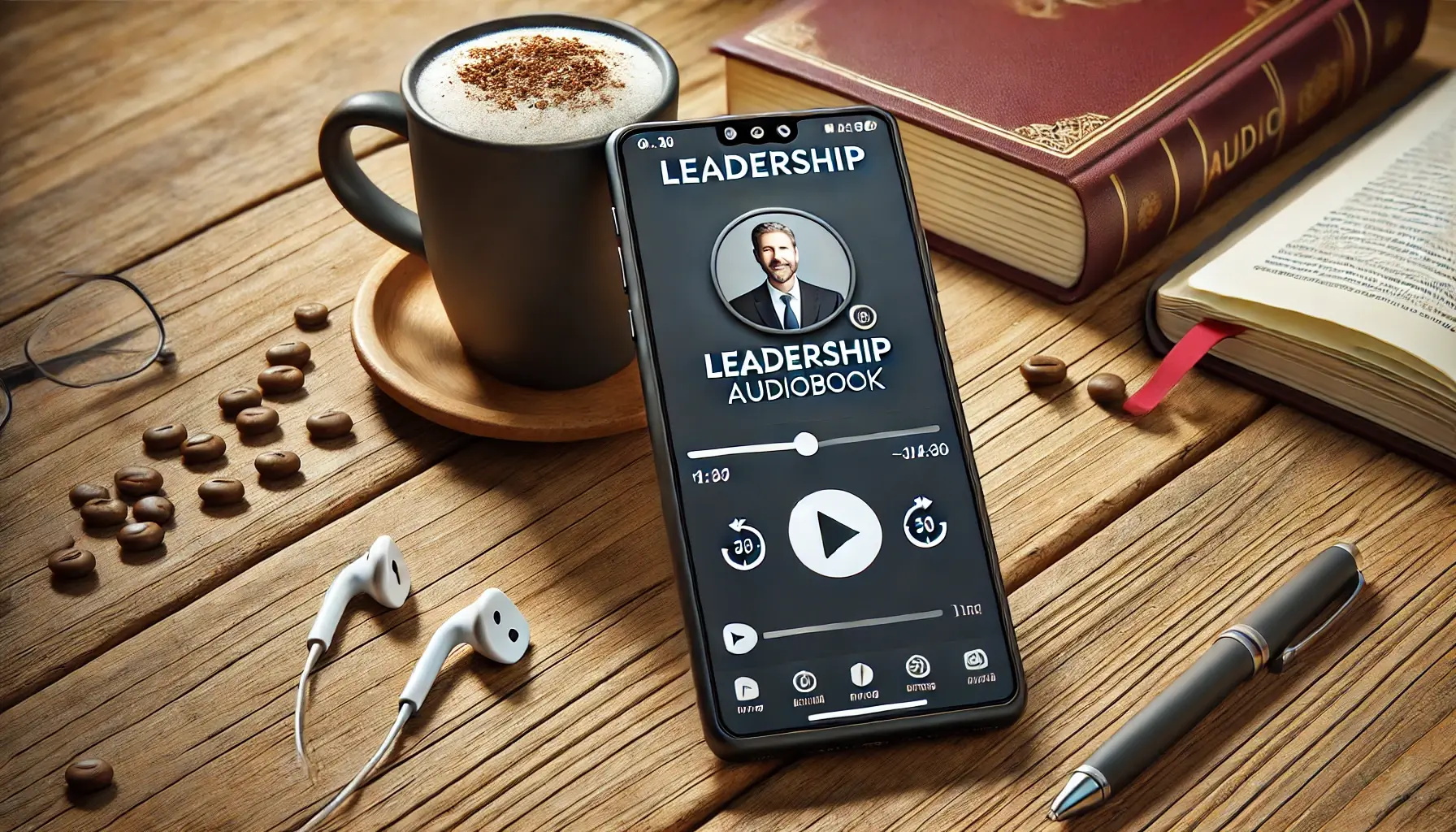Best Leadership Audio books to Make You a Better Leader

Introduction

In today's fast-paced world, continuous personal and professional growth is essential. Leadership audiobooks have become a popular tool for individuals seeking to enhance their leadership skills and knowledge. These audiobooks offer valuable insights and practical advice from experienced leaders and authors, making it easier to integrate leadership principles into daily life.
Listening to leadership audiobooks can significantly impact both personal and professional development. They provide access to diverse perspectives on leadership, helping individuals understand and adopt effective leadership styles. Audiobooks are particularly convenient for busy professionals, as they can be consumed during commutes, workouts, or any other time when reading a book might not be feasible.
The benefits of listening to leadership audiobooks are numerous. Firstly, they offer flexibility and convenience, allowing you to learn on the go. Audiobooks can also enhance retention and comprehension through auditory learning, making complex concepts easier to grasp. Additionally, they often feature real-life examples and stories, which can inspire and motivate listeners to apply what they've learned in their own leadership roles.
This article will explore key concepts of leadership audiobooks, highlighting insights from some of the most influential books in the genre. We will discuss essential laws of leadership, effective habits, and the role of emotional intelligence in leadership. Furthermore, we will review top leadership audiobooks that focus on skill development and practical leadership techniques. The article will also delve into the art of leadership, examining philosophical approaches and the concept of servant leadership. Finally, we will summarize key leadership lessons from various audiobooks and address frequently asked questions about leadership audiobooks.
Exploring the Key Concepts of Audio Books on Leadership
21 Irrefutable Laws of Leadership: What Makes a Great Leader?
John C. Maxwell's "The 21 Irrefutable Laws of Leadership" outlines fundamental principles that define great leaders. These laws are practical and applicable in various leadership situations. Some key takeaways include the importance of influence, the necessity of personal growth, and the power of serving others.
Maxwell's laws emphasize that true leadership is not about titles or positions but about influencing others positively. By focusing on continuous self-improvement and understanding the needs of your team, you can become a more effective leader. These principles are not just theoretical but are backed by real-world examples, making them highly relevant for today's leaders. For more insights on goal setting and leadership, visit the article on Andrew Huberman's approach to goal setting on Goalsetting.onlilne.
Unveiling the Habits of Highly Effective People in Leadership
Stephen R. Covey's "The 7 Habits of Highly Effective People" is another cornerstone in leadership literature. This book outlines habits that can transform personal and professional life. Key habits include being proactive, beginning with the end in mind, and seeking to understand before being understood.
These habits are crucial for developing a leadership mindset. They help leaders focus on their priorities, build strong relationships, and create a vision for their team. Covey's principles are timeless and have been adopted by leaders worldwide to achieve success.
Emotional Intelligence in Leadership: How Important Is It?
Emotional intelligence (EI) plays a critical role in effective leadership. "Emotional Intelligence 2.0" by Travis Bradberry and Jean Greaves provides actionable strategies to enhance EI. Key insights from the book highlight the importance of self-awareness, self-regulation, empathy, and social skills in leadership.
Leaders with high emotional intelligence can better manage their emotions, understand and influence others, and create a positive work environment. EI is essential for building strong teams and handling conflicts effectively. For more information on emotional intelligence, you can read about it on Psychologytoday.com.
Top Leadership Audiobooks for Skill Development

Leadership audiobooks are a valuable resource for those looking to develop their leadership skills. They offer practical advice and strategies from experienced leaders, making it easier to apply these principles in real-life scenarios. In this section, we will review some top leadership audiobooks that focus on skill development.
Discovering Maxwell's Insights on Effective Leadership
John C. Maxwell is renowned for his contributions to leadership literature. His audiobooks provide comprehensive insights into effective leadership practices. Maxwell emphasizes the importance of personal growth, influencing others positively, and maintaining strong ethical standards. His works are essential for anyone looking to enhance their leadership skills.
For more on professional development goals, you can explore Goalsetting.onlilne.
Implementing the 7 Habits of Highly Effective Leaders
Stephen R. Covey's principles from "The 7 Habits of Highly Effective People" are widely recognized for their impact on leadership development. These habits, such as being proactive and prioritizing effectively, are crucial for leaders aiming to improve their effectiveness. Covey's audiobook offers practical steps to integrate these habits into daily routines, making it an invaluable resource for aspiring leaders.
Understanding the Dichotomy of Leadership for Managers
"The Dichotomy of Leadership" by Jocko Willink and Leif Babin addresses the balance required in leadership. The book highlights the importance of being both a strong and compassionate leader. It provides insights into how leaders can maintain authority while being empathetic and approachable. This balance is critical for managers who need to navigate complex leadership challenges.
Willink and Babin's practical advice helps leaders understand how to apply these principles in real-world situations, ensuring they can lead effectively without compromising their values or their team's morale.
Mastering Leadership Techniques
Mastering leadership techniques is essential for anyone aspiring to be an effective leader. This section will discuss key strategies and tips for balancing leadership demands and enhancing leadership skills.
Dichotomy of Leadership: Balancing Contradictions
In "The Dichotomy of Leadership," Jocko Willink and Leif Babin address the challenge of balancing opposing forces in leadership. Leaders must be both strong and flexible, authoritative and empathetic. This book provides practical strategies for managing these contradictions, helping leaders make balanced decisions that benefit their teams.
By understanding the need for balance, leaders can avoid extremes and create a more harmonious and productive work environment. This approach ensures that leaders maintain their authority while also being approachable and supportive.
Enhancing Leadership Skills for Managers
Effective leadership requires continuous skill enhancement. Managers must focus on developing key skills such as communication, decision-making, and conflict resolution. Practical tips for improving these skills include seeking feedback, setting clear goals, and engaging in regular self-reflection.
Additionally, managers can benefit from structured goal-setting and planning. For more on goal setting and planning, you can visit Goalsetting.onlilne.
The Art of Leadership

Leadership is not just about managing tasks; it's about inspiring and guiding others towards a common goal. In this section, we will discuss different philosophies and approaches to leadership.
Leadership Is an Art: Exploring the Philosophy
Max DePree's "Leadership Is an Art" offers a philosophical approach to leadership. DePree emphasizes the human aspect of leadership, focusing on the importance of values, relationships, and trust. He believes that leadership is about serving others and enabling them to achieve their best.
DePree's perspective encourages leaders to foster a positive and inclusive culture within their organizations. By prioritizing the well-being and growth of their team members, leaders can create a more engaged and productive workforce.
Developing the Leader Within: Strategies for Success
John C. Maxwell's "Developing the Leader Within You" provides practical strategies for personal leadership development. Maxwell highlights the importance of self-discipline, vision, and influence. He offers actionable advice on how to develop these qualities and become a more effective leader.
Maxwell's insights are particularly useful for individuals at any stage of their leadership journey, as they focus on continuous self-improvement and the impact of personal growth on leadership effectiveness.
The Servant Leadership Approach: Putting Others First
Servant leadership is a style that prioritizes the needs of the team over the needs of the leader. This approach, championed by leaders like Robert K. Greenleaf, involves listening, empathy, and stewardship. The main goal is to serve and uplift the team, which in turn drives organizational success.
Adopting a servant leadership style can lead to higher employee satisfaction, increased trust, and better team performance. For more insights on the competitive advantage of servant leadership, you can read the article on Skipprichard.com.
Learning from Top Leadership Lessons
Leadership audiobooks provide valuable lessons that can be applied in various professional settings. This section will summarize essential insights from these audiobooks and discuss practical applications of leadership concepts.
Key Leadership Insights from Audiobooks
Leadership audiobooks offer a wealth of knowledge that can help leaders at all levels improve their skills. Key insights often include the importance of clear communication, the need for continuous personal development, and the value of empathy in leadership.
These audiobooks also highlight the significance of setting clear goals and maintaining a positive attitude. By adopting these insights, leaders can create a more productive and motivated team environment. For more information on team goals, you can visit Goalsetting.onlilne.
Applying Bestseller Leadership Concepts in Practice
The concepts from best-selling leadership audiobooks can be directly applied to enhance leadership effectiveness. Practical applications include setting SMART goals, practicing active listening, and fostering a culture of accountability within the team.
By implementing these strategies, leaders can improve team dynamics and achieve better results. For more on career goals, you can visit the article on Goalsetting.onlilne. Additionally, for a detailed discussion on applying leadership lessons, you can refer to Redbooth.com.
Conclusion

In conclusion, diving into the best seller audiobooks and books on leadership can significantly impact your ability to lead effectively. The best leadership books of all time provide invaluable insights into leadership and management. Whether you're a seasoned business leader or just starting, these resources are essential. From "Leaders Eat Last" to "Primal Leadership," and "The One Minute Manager," these books offer diverse perspectives on what makes a leader successful.
Leadership experts, with years of leadership experience, have written these books to bring out the best in every leader. They cover business leadership, team leadership, and purpose-driven leadership, helping you build your leadership capabilities. The best audiobooks and business books of all time, like the New York Times bestselling titles, are must-reads for anyone aiming to excel in leadership positions.
These resources combine leadership philosophy with practical leadership in action tips. From the battlefield to business and life, they cover principles of effectiveness and business strategy. Classics like "The Five Dysfunctions of a Team" and "Authentic Leadership" are essential for understanding different types of leaders and their guiding philosophies.
For business and personal growth, these best books on leadership offer core principles that can transform your approach to leadership, making you a more successful and effective leader in both business and in life.
FAQs
What Are the Best Leadership Audiobooks of All Time?
There are several leadership audiobooks that are considered essential listening for anyone looking to improve their leadership skills. Some top recommendations include:
- "The 21 Irrefutable Laws of Leadership" by John C. Maxwell
- "The 7 Habits of Highly Effective People" by Stephen R. Covey
- "Emotional Intelligence 2.0" by Travis Bradberry and Jean Greaves
These audiobooks provide valuable insights and practical strategies that can help you become a more effective leader.
How Can Leadership Audiobooks Improve My Skills?
Listening to leadership audiobooks can enhance your skills in various ways. They provide:
- Access to expert advice from renowned leaders
- Practical tips and strategies for everyday leadership challenges
- Inspiration and motivation to adopt new leadership styles
Are There Any Free Leadership Audiobooks Available?
Yes, there are several resources where you can find free leadership audiobooks. Public libraries often offer audiobooks through digital lending services like OverDrive and Libby. Additionally, websites like Librivox and Project Gutenberg provide free access to audiobooks of classic leadership texts.
How Do I Choose the Right Leadership Audiobook for Me?
Choosing the right leadership audiobook depends on your specific needs and goals. Consider the following tips:
- Identify the areas you want to improve, such as communication, emotional intelligence, or strategic planning.
- Read reviews and summaries to find audiobooks that match your interests.
- Look for recommendations from trusted sources or colleagues who have similar goals.
By selecting audiobooks that align with your objectives, you can ensure that you gain the most relevant and useful insights.
Can Audiobooks Replace Traditional Leadership Training?
Audiobooks can be a valuable supplement to traditional leadership training but may not completely replace it. They offer flexibility and convenience, allowing you to learn on the go. However, traditional training often provides interactive and hands-on experiences that audiobooks cannot replicate. A combination of both can be highly effective in developing well-rounded leadership skills.